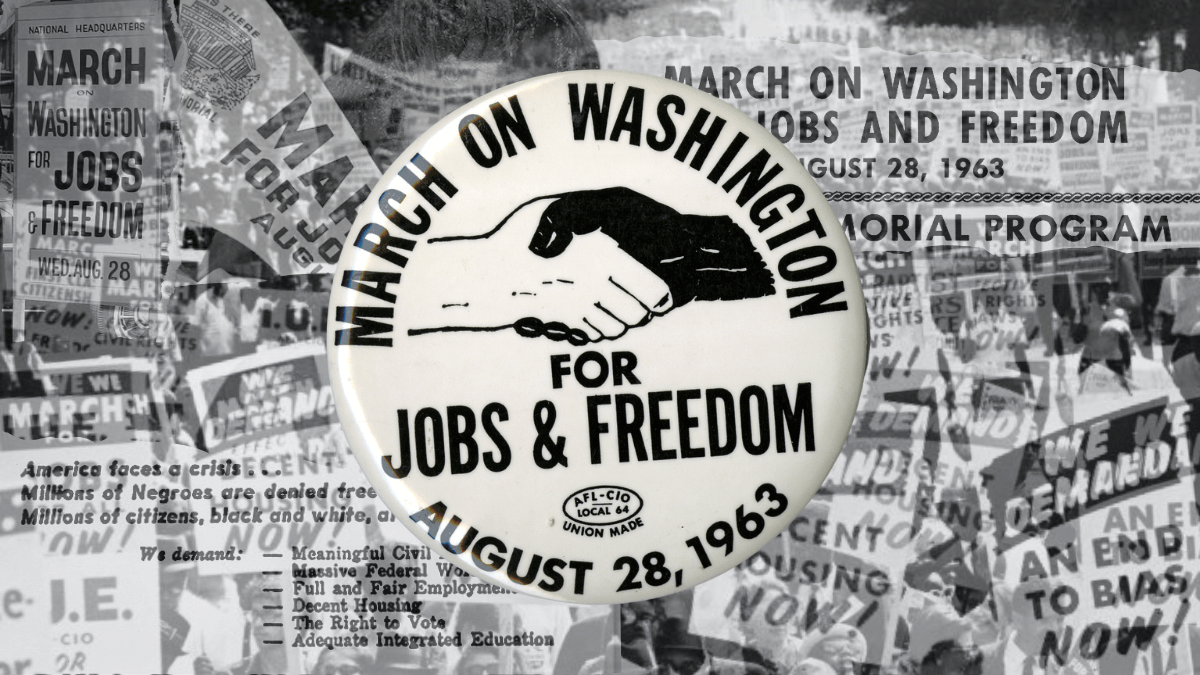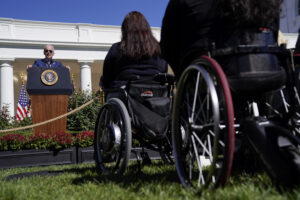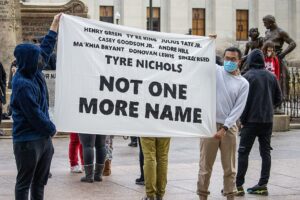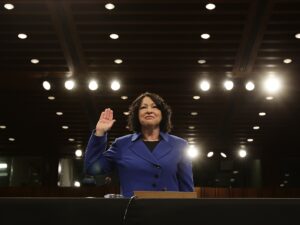Sixty Years After the March on Washington
To build a better future for workers, we must recognize the racist and blood-stained history of U.S. labor and the shortcomings of the labor movement’s past. Illustration: Prism.
Illustration: Prism.
Despite the myriad ways the government and its many agents have painted the U.S. as a model of freedom and democracy, most of us remain unfree, underrepresented, and born to accumulate debt, work, procreate another generation of the workforce, and die. This sounds dark, but so is the history and reality of the U.S.—this is a truth we must face collectively.
American identity and capitalism are defined by settler colonialism and chattel slavery. There is no such thing as the U.S. without the brutal histories of the slave trade, the mass murder and displacement of Indigenous peoples, the extraction of resources from the land, and the destruction of the very environment that sustained us. The nation’s foundation is drenched in blood, and nothing illustrates the far-reaching, systemic, and reverberating effects of how the U.S. was built more than who is disproportionately disenfranchised, poor, sick, imprisoned, missing, and killed by the state compared with who profits from it.
An overworked and enslaved Black workforce is foundational to the U.S. and its economy, and so even as racial justice efforts have moved toward equality in law, the structures that maintain a permanent non-white underclass remain firmly in place. Dismantling the very structures that have resisted efforts even to name the connection between racism and labor injustice has remained an ongoing battle, as efforts to maintain the status quo grow more desperate and destructive.
Politicians, corporate-owned media, and our education system water down these realities to a state of palatability to continue the unquestioned adherence to American patriotism and its goals as an economic and imperialist power. But racism, labor, and economic well-being and justice in the U.S. are inextricably linked. As Prism’s reporting on racial (in)justice, labor organizing, and unionization uncovers, Black, Indigenous, and people of color (BIPOC), especially low-income, poor, and working-class BIPOC and all workers, continue to be sacrificed at the altar of capitalism by the state’s actions (and inactions) and the corporations they condone and support.
Writer James Baldwin was barred from speaking altogether because of his identity as a gay man and the fear that he would be too inflammatory.
It is fitting for us here at Prism to mark the 60th anniversary of the 1963 March on Washington for Jobs and Freedom. Created by labor unionist A. Philip Randolph and activist Bayard Rustin, the march mobilized 250,000 people for Black Americans’ economic and civil rights. Black labor advocates, unions like the United Automobile Workers (UAW), organizers, civil rights groups like the NAACP and Southern Christian Leadership Conference (SCLC), Black activists, and workers understood that their call to action, their fight, and their efforts were stronger together as a united front, even if there were differences in politics and strategy on a more granular level. Ultimately, the march was exceptional in its sheer scope and pressured then-President John F. Kennedy’s administration to push the Civil Rights Act through Congress.
But there were and remain many critiques of the march; Malcolm X called it the “farce on Washington” and later stated, “Yes, I was there. I observed that circus. Who ever heard of angry revolutionists all harmonizing ‘We Shall Overcome…Suum Day…’ while tripping and swaying along arm-in-arm with the very people they were supposed to be angrily revolting against? Who ever heard of angry revolutionists swinging their bare feet together with their oppressor in lily-pad park pools, with gospels and guitars and ‘I Have A Dream’ speeches? And the black masses in America were—and still are—having a nightmare.”
As an organizer and participant of the march, John Lewis had to revise his original speech after other organizers asked him to tone down parts deemed too inflammatory and critical of the Kennedy administration. Lewis’ anger at President Kennedy resulted from his administration’s failure to support the Civil Rights Movement. Lewis’ original speech clearly denounced the civil rights bill, stating, “In good conscience, we cannot support wholeheartedly the administration’s civil rights bill, for it is too little and too late. There’s not one thing in the bill that will protect our people from police brutality.”
Writer James Baldwin was barred from speaking altogether because of his identity as a gay man and the fear that he would be too inflammatory. In response, Baldwin noted, “In my view, by that time, there was, on the one hand, nothing to prevent—the March had already been co-opted—and, on the other, no way of stopping the people from descending on Washington. What struck me most horribly was that virtually no one in power (including some blacks or Negroes who were somewhere next door to power) was able, even remotely, to accept the depth, the dimension, of the passion and the faith of the people.” Notably, no women were included in the line-up of speakers, and Rosa Parks, Gloria Richardson, and Lena Horne were escorted off the main stage before Dr. Martin Luther King’s “I Had a Dream” speech.
Dr. King’s speech at the march was rousing and his most well known. Though to reach a wider audience, it was markedly less radical than his sermons and much of his work, which often expressly critiqued capitalism, white supremacy, and imperialism and called for racial and economic justice in direct and scathing terms. A year before he was murdered, Dr. King stated in “The Three Evils” speech, “Again we have deluded ourselves into believing the myth that capitalism grew and prospered out of the Protestant ethic of hard work and sacrifices. Capitalism was built on the exploitation of Black slaves and continues to thrive on the exploitation of the poor, both Black and white, both here and abroad.”
Dr. King’s work also notably includes the Poor People’s Campaign, organized with the SCLC, which presented their version of the Economic Bill of Rights to then-President Lyndon B. Johnson in 1968 after Dr. King’s assassination. They pointed to the nature of poverty and how to end it:
1. A meaningful job at a living wage for every employable citizen.
2. A secure and adequate income for all who cannot find jobs or for whom employment is inappropriate.
3. Access to land as a means to income and livelihood.
4. Access to capital as a means of full participation in the economic life of America.
5. Recognition by law of the right of people affected by government programs to play a truly significant role in determining how they are designed and carried out.
We can observe these demands and see how far we are from these goals.
In the six decades since the march, the U.S. government and the lobbying power of corporations have systematically hacked away at labor power, unions, and critical workers’ rights gains, and workers are currently experiencing the effects. Black Americans disproportionately continue to live in a hyper-surveilled police state and are terrorized by police forces that murder with impunity.
Our on-the-ground coverage also shows that communities and organizers are still fighting against these violences.
Our on-the-ground coverage also shows that communities and organizers are still fighting against these violences. Workers have been—and still are—fighting back, including the Black working class, incarcerated laborers, a new union organizing service workers in the South, artists in Miami fighting for basic housing rights, and migrant workers organizing for labor protections amid worsening climate conditions. As Union of Southern Service Workers organizer, fast food and home health care worker Mama Cookie states in her interview with Prism editor-at-large, Tina Vásquez, “The March on Washington tried to make things better, but today we’re still marching. So what’s really changed in what we marched for then and what we’re marching for now?”
Our reporting reflects the lived realities of Black families and communities, and the fight for labor rights and everything it touches continues; the march continues.
Your support matters…Independent journalism is under threat and overshadowed by heavily funded mainstream media.
You can help level the playing field. Become a member.
Your tax-deductible contribution keeps us digging beneath the headlines to give you thought-provoking, investigative reporting and analysis that unearths what's really happening- without compromise.
Give today to support our courageous, independent journalists.






You need to be a supporter to comment.
There are currently no responses to this article.
Be the first to respond.